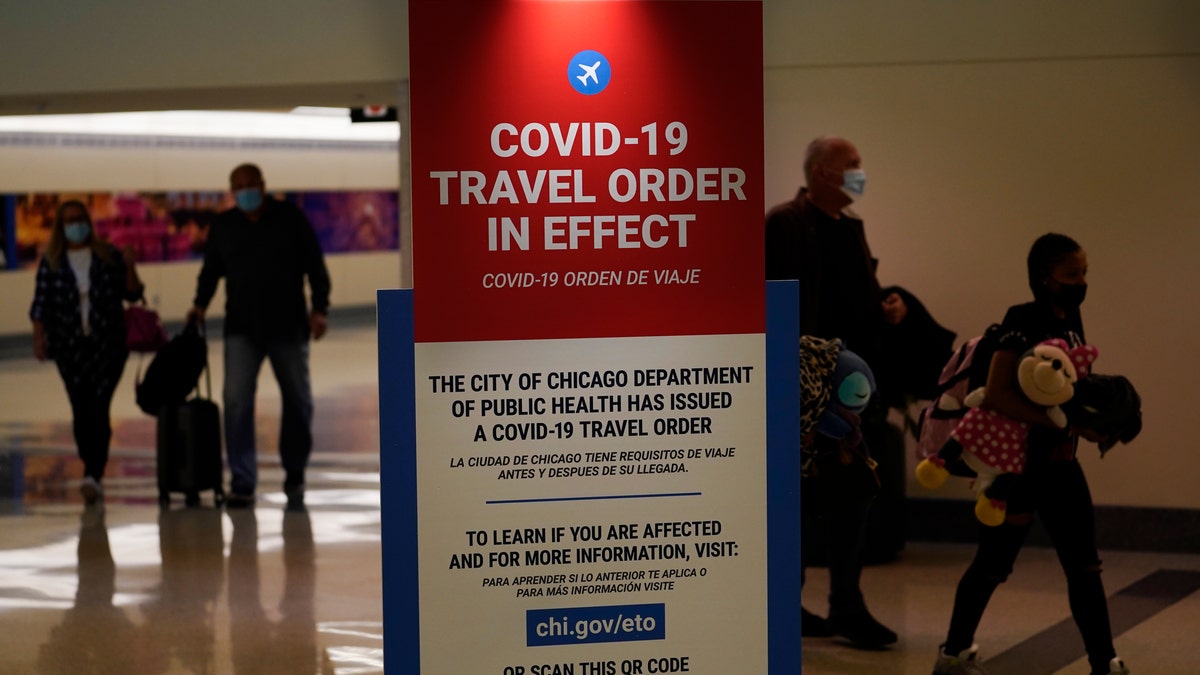Surgeon General on CDC urging Americans not to travel for Christmas
Vice Admiral Jerome Adams provides insight about the surge in COVID cases on 'The Daily Briefing'
Public health officials and political leaders have pleaded with Americans to forego holiday travel this year as the nation rounds out 2020 still in the midst of the coronavirus pandemic, but if it cannot be avoided there are some tips and guidelines that can help limit the risk.
"The safest way to celebrate winter holidays is at home with people who live with you," the Centers for Disease Control and Prevention (CDC) said. "Travel and gatherings with family and friends who do not live with you can increase your chances of getting or spreading COVID-19 or the flu."
The health agency urges travelers to consider whether you or someone within your household or someone you will be visiting is at an increased risk for severe illness due to COVID-19 and whether there are increasing rates of COVID-19 within the community that you plan to visit. Travelers are also encouraged to check the hospital capacity at their destination and to consider whether there are requirements or restrictions in the area for travelers.
CORONAVIRUS LOCKDOWNS BY STATE: WHAT YOU NEED TO KNOW
Travelers are also encouraged to consider the ways in which they are traveling, and whether it is possible to maintain 6 feet of distance on the train, bus or airplane. The CDC also asks travelers to take inventory of who they are traveling with, including those who don’t live with them.
"If the answer to any of these questions is ‘yes,’ you should consider making other plans, such as hosting a virtual gathering or delaying your travel," the agency advises.

Travelers are encouraged to check their destination's restrictions ahead of time. (AP Photo/Charles Rex Arbogast, File)
Those who choose to forge ahead with plans should consider testing before and after you travel, check travel restrictions before leaving, get a flu shot ahead of time, wear a mask correctly, maintain social distancing, wash their hands often, avoid touching their face, pack food to limit stops, and to recognize when delaying travel is the safest plan.
"People who are sick, have recently tested positive for the virus that causes COVID-19, or have been exposed to a person with COVID-19 pose a risk to others during travel," the CDC said.
HELPING KIDS COPE WITH CORONAVIRUS-RELATED CHANGES AMID HOLIDAY SEASON
Those who are sick or have suspected or diagnosed COVID-19, including those who are asymptomatic, should not travel. Delaying the trip "when you could spread COVID-19 also protects other travelers, people who work in travel settings, and those at your destination."
"Celebrating virtually or with the people you live with is the safest choice this winter," the CDC said. "If you do gather with people who don’t live with you, gatherings and activities held outdoors are safer than indoor gatherings."
It’s also important for travelers who are getting to their destination by air to follow testing advice and quarantine measures, the CDC said. Travelers should get tested 1-3 days before the flight, and 3-5 days after travel, and stay home for a week after traveling even if they test negative during that time period.
FAUCI RESPONDS TO CRITICS OF CHRISTMAS MESSAGE
Those who choose to skip testing should stay home for 10 days after traveling.
"A negative test does not mean that you were not exposed; you can still develop COVID-19," the agency warned. "Watch for symptoms for 14 days after travel, immediately isolate yourself if you develop symptoms, and learn what to do if you are sick."
CLICK HERE FOR COMPLETE CORONAVIRUS COVERAGE
If you are traveling to a holiday celebration, the health agency advises discussing with the host ahead of time to determine expectations for the event, and to bring along your own food, drinks, plates, cups, utensils and condiment packets. You should also wear a mask both indoors and outdoors, avoid shouting or singing, and stay home if you are sick or have been near someone who thinks they may have or have been exposed to COVID-19.
"It’s okay if you decide to stay home and remain apart from others," the CDC said. "Do what’s best for you."









































